Building On Positive Relationships by Laura McCulloch
Welcome to this month’s Family Learning blog. I wanted to use this blog as a chance to share an insight into other aspects of support delivered by the Family Learning Team. As well as the programmes we delivery across both primary and secondary schools, we also support delivery of the Building on Positive Relationships parenting programme. I hope to explain what the programme is, provide an overview of key approaches covered in the programme, and hopefully include some helpful strategies which you will be able to take away and use within your own family.
What is Building on Positive Relationships (BPR)?
Building on Positive Relationships (BPR) is a new approach which builds on existing relational and nurturing approaches across North Ayrshire’s educational establishments.
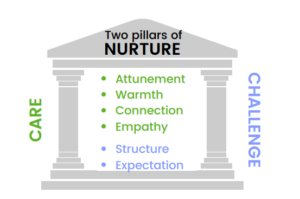
BPR uses the principles of Non-Violent Resistance Approach (NVR), to help families where there are challenges that impact on the family dynamics. It is a 10-week programme that offers an alternative to families who are feeling helpless when using traditional strategies, such as rewards and sanctions and provides families with a support network to help them rebuild relationships, in a supportive and non-judgemental environment.
Four Elements to Building on Positive Relationship (BPR)
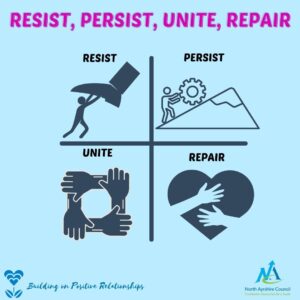
There are four key elements to Building on Positive Relationships which are explored during the 10-week programme.
What do we mean by these 4 elements?
RESIST – This is about taking a firm and calm stand, showing your strength and positive values by resisting unacceptable behaviour. We look to de-escalate conflicts by using practical, practised strategies.
PERSIST – Look to create small reconciliation gestures and tokens of care that increase positive interactions with the young person, despite ongoing unacceptable behaviours.
UNITE – The importance of recruiting and utilising supporters is key in ensuing no one feels alone. We look to identify a specific way in which they can help you and the young person.
REPAIR – Look to increase your physical and emotional presence and make rebuilding relationships a priority.
Techniques of Building on Positive Relationship (BPR)
I am going to try my hardest to provide an overview of the key areas covered during the 10 weeks parenting programne, hopefully providing an insight into the main approaches and strategies which may provide you with new ways of dealing with behaviours or situations at home.
1. Self-Care
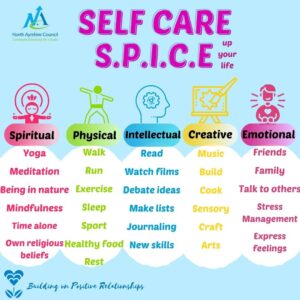
Each week we stress the need to take care of ourselves – we talk about “you cannot pour from an empty jug”. Self-care can be a variety of activities – from taking time out to read a book, to putting on your trainers and going for a nice walk. We are very aware there are barriers to self-care, such as time, lack of support, or feelings of guilt. However, the benefits of taking care of ourselves massively outweigh the barriers. Have a look at the self-care image above and see if any of the ideas jump out at you. Remember these are just suggestions, feel free to create your own list of self-care ideas.
2. De-escalation
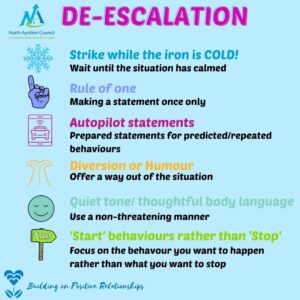
Have a look at the image above and see if any of the de-escalation techniques sound familiar to you. You might not call them the same thing, but you may recognise techniques you already use. There might be suggestions that are new to you or have made you think about things slightly differently. Let’s take “strike while the iron is COLD”. It can be so helpful to take some time after an incident to allow things to calm down before trying to talk about what happened. This time is important for everyone involved and hopefully allows things to be discussed when everyone feels more able to express their thoughts and emotions.
3. Parental Presence and Relational Gestures
When children are growing up, parents/carers are there to tell them what is right and what is wrong, and how they should behave. Over time children learn what their parents would think even when they are not around. This helps children know how to behave when their parents are not there. This is what we call ‘parental presence’ because the parent is present in the child’s mind.
When a child or young person behaves in a way that is seen as wrong, then it could be said that ‘parental presence’ has been lost, meaning the influence of parents/carers is no longer strong enough to help the child know how to behave. We look at ways to re-establish parental presence to remind your child that you love them and will be there for them no matter what, however you will resist their unacceptable behaviour.
How can you get parental presence back?
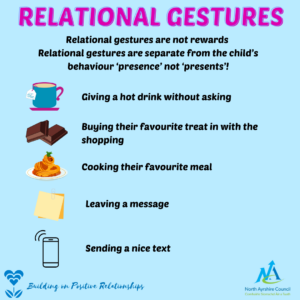
What are Relational Gestures?
Relational Gestures can also be known as ‘love gestures’ or ‘small acts of botherdness’ carried out by parents/carers. They are an important part of rebuilding the relationship with your child and can raise parental presence. They are not rewards and are separate from your child’s behaviour.
The image above gives a couple of suggestions, from making their favourite dinner as a surprise or sending them a text during the day to let them know you are thinking of them. I am sure you will be able to create a list of many different ideas unique to your child.
4. Prioritising Behaviours
It is impossible to address everything at the one time, so deciding where to begin is important. Parents/Carers often find this part difficult as it involves agreeing on what to tackle first and how to do this.
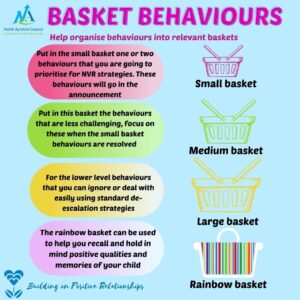
Have a look at the image above. Baskets can be used to help prioritise the behaviours you wish to focus on. You might feel like you have a long list of behaviours that you would like to change. Start by putting your list of behaviours onto paper – try and be specific, for example ‘hitting out at their sibling’. You are listing the behaviour as well as who the behaviour is aimed at. Once you have your list, you can start organising them into baskets. The rainbow basket is there to remind you of their positive qualities, or things they are good at. Once you have the behaviours sorted into baskets, you can see what behaviours you will be focusing on first.
Hopefully my BPR blog has provided an insight into some of the main approaches covered during the 10-week programme and has given you some new strategies to take away and try. The programme is delivered across North Ayrshire in schools as well as in community spaces, throughout the school year. After reading my blog, if you feel you would like to discuss the programme further, or ask any questions please feel free to email the Family Learning Team at familylearningteam@north-ayrshire.gov.uk

